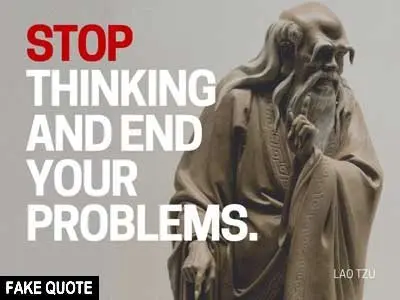|
Tao Te Ching
THE TAOISM OF LAO TZU
|
Fake Lao Tzu Quote"Stop thinking..."
This is NOT a quote from Tao Te Ching:"Stop thinking, and end your problems."
To stop thinking is not only detrimental to any philosophy — it is impossible, also to Lao Tzu. He repeatedly encouraged the reader to contemplate the order of life and the workings of Tao, the Way. His ideal was the sage, who can reason and thereby reveal the true essence of nature. The ideal of no thinking is more of a Zen thing, with its concept of empty mind — mushin in Japanese, which also implies freedom of ambition and longing. It is the basis of Zen meditation: sit and think of nothing. There are several similarities between Buddhism, especially Zen, and Lao Tzu's Taoism. But not here. Lao Tzu's world was not one to turn away from, but instead to accept as it was. That, too, is easier said than done.
Now, regarding placing the line in chapter 20: Originally, Tao Te Ching had no division into 81 chapters. That's a much later edit, probably at the 1st century BC. The number of chapters was to reach the symbolic symmetry of 9 X 9. The consequence has been an additional complication in understanding the text as it was meant. Verses on different subjects have been combined, and some verses have been split up between chapters wrongly, adding confusion for the reader. As if the text was not already difficult to understand. Of the above quotes, only I and Robert G. Henricks put the line as the last of chapter 19, instead of the start of chapter 20. But it has been an issue of discussion among Lao Tzu translators and commentators for long. I have followed Henricks' strong arguments for this (page 224), which also seem to be confirmed by the two old Tao Te Ching manuscripts discovered in Mawangdui, 1973. They are from around 200 BC. That may have changed with the Guodian findings in the 1990s of Tao Te Ching fragments a hundred years older than those of Mawangdui. Examining the Guodian manuscripts in his book from the year 2000, Henricks found clear support in these findings for the line belonging to chapter 20 (page 29). The final verdict may not be in yet, but in any case the wording of the quote is not affected by what chapter it belongs to. Lao Tzu would have allowed us to continue pondering it. He might even have been amused. For more about Stephen Mitchell and his version of Tao Te Ching, see the chapter A good traveler has no fixed plans.
Stefan Stenudd September 20, 2020.
More Fake Lao Tzu QuotesThere are many more fake Lao Tzu quotes examined on this website. Click the header to see a list of them.
Fake interview with the authorClick the header to read a "fake" interview with Stefan Stenudd, the author of Fake Lao Tzu Quotes.
About CookiesMy Other Websites:I Ching OnlineThe 64 hexagrams of the Chinese classic I Ching and what they mean in divination. Try it online for free.
Qi Energy ExercisesThe ancient Chinese life energy qi (chi) explained, with simple instructions on how to exercise it.
Life EnergyThe many ancient and modern life force beliefs all over the world explained and compared.
Taoismen på svenska
Other Books by Stefan StenuddClick the image to see the book at Amazon (paid link).
The Greek philosophers and what they thought about cosmology, myth, and the gods. |
 Tao Te Ching
Tao Te Ching Now it's a book, too!
Now it's a book, too! Tao Quotes
Tao Quotes Cosmos of the Ancients
Cosmos of the Ancients Qi — Increase Your Life Energy
Qi — Increase Your Life Energy Aikido Principles
Aikido Principles Life Energy Encyclopedia
Life Energy Encyclopedia Archetypes of Mythology
Archetypes of Mythology Stefan Stenudd
Stefan Stenudd